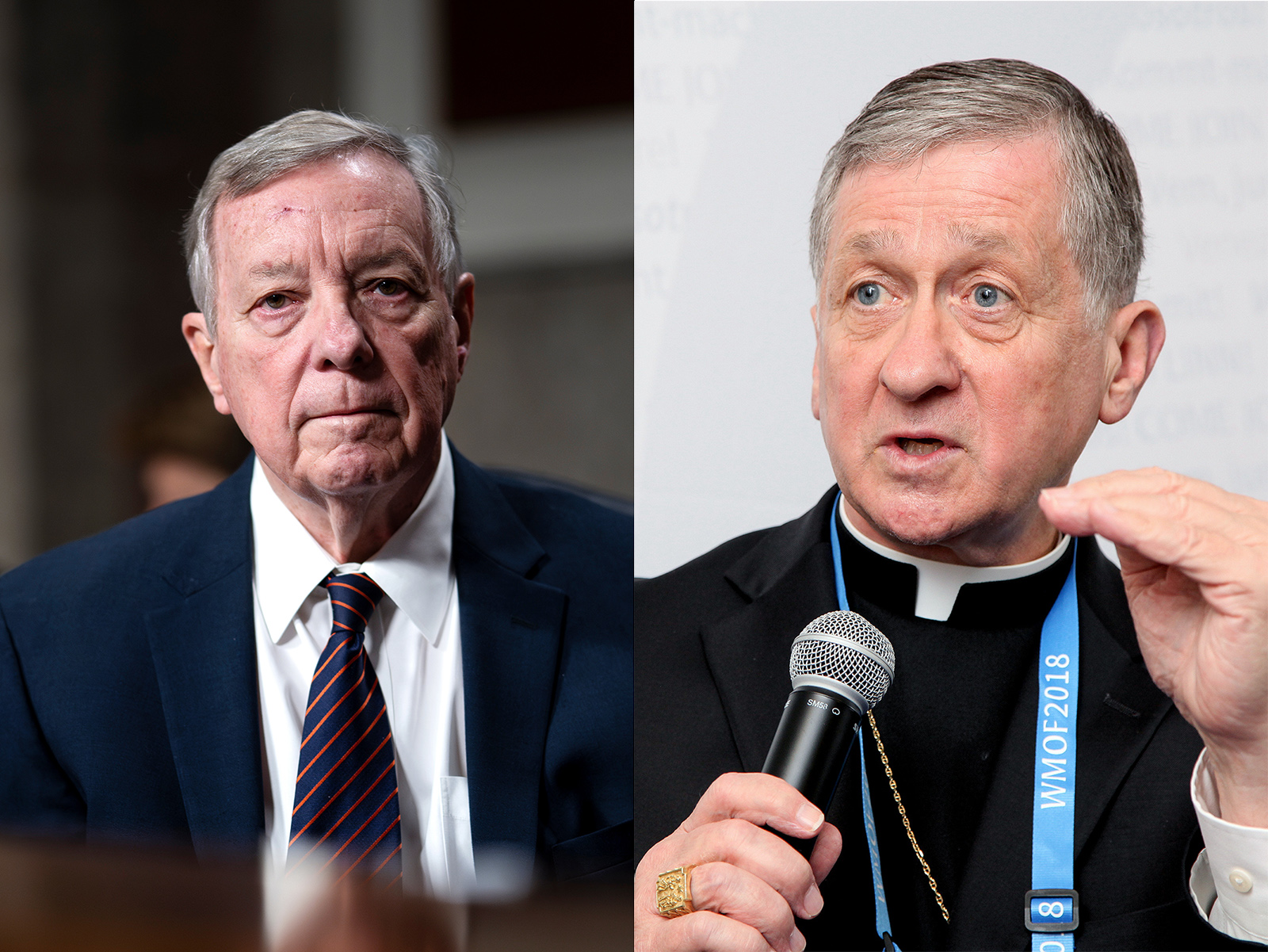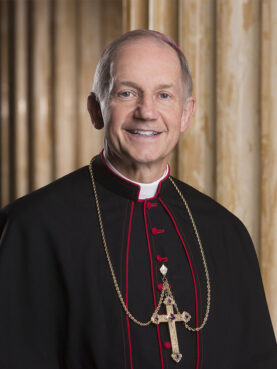
(RNS) — The Catholic bishop of Springfield, Illinois, Thomas Paprocki, has caused a stir over the past days by objecting to the Chicago archbishop’s decision to honor U.S. Senator Dick Durbin, who has supported abortion rights in law, with a Lifetime Achievement Award. The blowup made me wonder what the bishop would say if the roles were reversed and Chicago’s cardinal had been honored by a Democratic politician.
But I already knew the answer: He would say nothing. Or, at least, that’s what happened when Chicago’s then-Cardinal Joseph Bernardin received the Medal of Freedom from Bill Clinton.
In those days, when Bernardin was honored, Paprocki felt no particular need “to say something,” as he does now, when, as Paprocki put it this week, the church will honor “those who act in defiance of our fundamental moral principles.” Instead Paprocki, then chancellor of the Chicago Archdiocese under Bernardin, checked his principles and held his tongue.
Although Durbin is being recognized specifically for his leadership on immigration issues, and though abortion is unrelated to immigration in public policy, in Paprocki’s view, Durbin is unworthy of being honored by the Church. As Durbin’s bishop, Paprocki, who also banned the senator from receiving Communion, has called on Cardinal Blase Cupich of Chicago to retract the award.

Bishop Thomas J. Paprocki in 2018. (Photo courtesy of the Diocese of Springfield in Illinois)
For faithful Catholics like this writer, a bishop is an indispensable figure. Standing in the place of Jesus’ apostles, a bishop teaches the Catholic faith with authority. It is a solemn duty and a sacred office. The status of a Catholic bishop should make it unseemly for anyone in the role to cast snide, public innuendoes suggesting that a cardinal is a “heretic,” (as Paprocki did in 2023 after Cardinal Robert McElroy suggested in the magazine First Things that sexual sins should not bar Catholics from receiving Communion).
It is just as unseemly for a Catholic bishop to intrude on “decisions made in another diocese.” Paprocki suggests Cupich did just that by giving an award to Durbin, who “has his home … in Springfield.” But this is a thin claim of “jurisdiction” over Durbin, especially given that Durbin has joined a Chicago congregation after Paprocki barred him from the Communion rail.
Paprocki’s intrusion is a problem under the Code of Canon Law, which tells us that Cupich holds “all the ordinary, proper, and immediate power” of a Catholic bishop in his archdiocese. Only one bishop governs in Chicago. Cupich likely has opinions about what happens in Springfield, but he has had so much decency as to keep silent about them.
Paprocki’s agitation has emboldened yet other bishops to weigh in. San Francisco Archbishop Salvatore Cordileone “stand(s) in solidarity with Bishop Thomas Paprocki,” offering ideas about what Cupich should do in Chicago. Cordileone has no connection to Springfield, Chicago or the Midwest that I am aware of. He lacks even the justification Paprocki has named. The same goes for bishops in New Mexico, Nebraska and elsewhere who have seconded Paprocki.
All of this is also bad for the Catholic Church. It crosses lines our own institutions teach us should not be crossed. The Church began to normalize public conflicts among U.S. bishops long ago when several cardinals attacked Cardinal Bernardin’s effort to promote dialogue among Catholics. Nothing good will come if what Paprocki and Cordileone have begun here also becomes normalized.
But actually, I have an altogether different concern. In his remarks about Durbin, Bishop Paprocki invoked Cardinal Bernardin’s consistent ethic of life. As Bernardin’s biographer, I am aware that Paprocki, a canon lawyer, did not assist Bernardin when the consistent ethic was formulated. That work was done by others who are moral theologians.
For these reasons, it is understandable if Paprocki has a narrow view of what the consistent ethic means. Public consciousness of the ethic has been narrowed by decades of criticism from those concerned the ethic would “sabotage the pro-life movement,” as it asked Catholics to think about other issues, too. There is so much distortion and misinformation about the consistent ethic that I wrote a book recently to reclaim the ethic from its critics.
Certainly, as Paprocki quotes him, Bernardin never intended the consistent ethic to say that abortion does not pose an important moral problem. But in dozens of public remarks and speeches about the consistent ethic from 1983 until 1995, Bernardin said much more than that. Not to consider all of that surely is a misuse of the consistent ethic.
It simply strains believability that a consistent ethic of life nurtured in a pastoral letter of the U.S. bishops addressing nuclear war would insist that we focus on abortion to the exclusion of other threats to life. This is especially true because the Second Vatican Council, whose teachings inspired the consistent ethic, named “murder, genocide, abortion, euthanasia” as well as “subhuman living conditions, arbitrary imprisonment, deportation, slavery, prostitution, the selling of women and children; as well as disgraceful working conditions,” among other things. It urged Catholics to be consistent in our defense of human persons because they all are “infamies” that “are supreme dishonor to the Creator.”
Nothing in church teaching tells us we can set those other threats to human life aside while we focus on abortion. Again and again, the church insists we must be consistent because there are so many ways that human life is threatened.
For this reason, Bernardin spoke often about how the consistent ethic of life is more like “an attitude” or a way of approaching moral problems. A consistent ethic of life is seen in our conversion to treasure life always and in all cases. That is a challenging call, and I have yet to meet the perfectly consistent Catholic. If he is inconsistent, Durbin is not alone. It is inconsistent to deprioritize deportation, for example.
Paprocki’s remarks have one more fundamental problem. As a Catholic, Durbin is accountable to the gospel. But as a public official, he is accountable to all of the people of the United States and their laws.
I often point out that officials like Durbin swear an oath to “support and defend the Constitution … without any mental reservation or purpose of evasion.” For most of Durbin’s time in public life, the Constitution protected access to abortion. It is a funny thing how so many Catholics have expected public officials like Durbin to defy the Eighth Commandment and ignore that oath. They seem to have wanted Durbin to assert a “mental reservation,” or try to evade his oath to support the Constitution when it came to abortion. That hardly seems like a serious or tenable moral position.
These challenges pose Catholics in public life with incredibly difficult dilemmas that lack clear answers. I do not know how Durbin, in his conscience, sorted through all that complexity across so many years. Neither do Paprocki or Cordileone. I do know Durbin has been an admirable and honest public servant who has made many people’s lives better, including many people who have sought a better life in this country despite how unwelcoming we can be.
Those surely are good things that defend human life. And, there is no good reason on God’s earth why the Archdiocese of Chicago should not honor him for that.
(Steven P. Millies is the author of “Joseph Bernardin: Seeking Common Ground and A Consistent Ethic of Life” and “Navigating Catholic Engagement with U.S. Politics.” The views expressed in this commentary do not necessarily reflect those of Religion News Service.)
